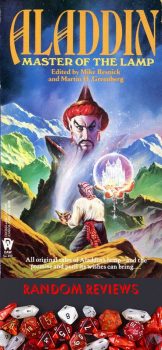Random Reviews: “Slaves of the Magic Lamp” by Anthony R. Lewis

In November 1992, Disney released the animated film Aladdin, with Scott Weinger providing the title character’s voice, Linda Larkin portraying his love, Jasmine, and the late and lamented Robin Williams voicing the Genie. About the same time, Mike Resnick and Martin H. Greenberg edited an original anthology designed to take advantage of Disney’s new film. DAW Books published Aladdin: Master of the Lamp in December 1992, containing more than forty original stories by authors ranging from Janet Kagan and George Alex Effinger to Kate Daniel and Mark Aronson.
Atypical of most original anthologies, Aladdin: Master of the Lamp contains two stories each by Jack C. Haldeman II, Anthony R. Lewis, and Barry N. Malzberg. Lewis, who is best known as the Chair of twenty-ninth Worldcon, Noreascon, in 1970, and for the work he has done with NESFA Press, has also written several short stories, including “Fair Exchange,” which opens Resnick’s anthology, and “Slaves of the Magic Lamp,” which appears about half-way through.
Lewis elects to structure his story as a tale within a tale, although it isn’t clear that such a conceit is necessary, aside from playing homage to the version of the Aladdin story told in One Thousand and One Nights. In this case, the narrator is Lady Vashti, a cat/shapeshifter who exists outside the bounds of the physical world.
Vashti’s story takes her, in human form, to Manhattan in 1931, where she meets with an advertising executive, Eugene Jannson, who turns out to be a djinn, Hassan, in human form. Of course, just as humans have wishes for djinni to grant, so, too, do djinn have wishes that they would like to have granted. Hassan shares his wish with Vashti. He wants to have his stories published in the great pulps: Weird Tales, Argosy Weekly, Munsey’s All-Story, and so on. Unfortunately, despite being the author of One Thousand and One Nights, Hassan isn’t able to get past the slush pile with the editors.
Through the course of their conversation, it becomes clear that the reason Hassan’s work is being rejected it because it isn’t very good and not up to the standards, such as they were, of the pulp magazines (which, if you read other reviews in this series, were often pretty low, we tend to remember and reprint the best examples). In addition, Lewis plays around with the idea of the djinn in a lamp, explaining that the very idea is based on a mistranslation of the original text. The lamps, or rings, or other summoning devices are merely a gateway for the djinns to come through when summoned.
Even as she realizes that Hassan’s stories are not as good as he seems to think they are, Vashti’s role is to help him achieve his dream. Rather than use the tried and true trope of a wish being granted in the worst possible way, Vashti decides to come up with a means of granting Hassan his wish in a manner that will completely satisfy him, even if it has potentially negative connotations for the rest of the world. The solution is clever and gives a double meaning to the title, although there is a certain amount of elitism condescension in Vashti’s resolution.
Lewis manages to cover quite a bit in the few pages of the story. The relationship between Vashti and Hassan is intriguing, hinting at previous encounters and Lewis indicates Vashti’s tremendous amount of power in just a few words with her interaction with Hassan’s secretary/gatekeeper. The framing device appears superfluous, but it doesn’t detract from the primary portions of the story.
Two years after editing Aladdin: Master of the Lamp, Resnick and Greenberg would co-edit the anthology Deals with the Devil. Looking at the concepts behind two anthologies, it interesting to note how similar they are. Traditionally deals with the devil and wishes granted by a Genie are both done in a way that takes the letter of the law into account, giving the mortal what they say they desire in a manner which subverts the intent of the wish or deal.
 Steven H Silver is an eighteen-time Hugo Award nominee and was the publisher of the Hugo-nominated fanzine Argentus as well as the editor and publisher of ISFiC Press for 8 years. He has also edited books for DAW, NESFA Press, and ZNB. His most recent anthology is Alternate Peace and his novel After Hastings was published in 2020. Steven has chaired the first Midwest Construction, Windycon three times, and the SFWA Nebula Conference 6 times. He was programming chair for Chicon 2000 and Vice Chair of Chicon 7.
Steven H Silver is an eighteen-time Hugo Award nominee and was the publisher of the Hugo-nominated fanzine Argentus as well as the editor and publisher of ISFiC Press for 8 years. He has also edited books for DAW, NESFA Press, and ZNB. His most recent anthology is Alternate Peace and his novel After Hastings was published in 2020. Steven has chaired the first Midwest Construction, Windycon three times, and the SFWA Nebula Conference 6 times. He was programming chair for Chicon 2000 and Vice Chair of Chicon 7.
I have to confess I’ve never read anything by Anthony R. Lewis, but “Slaves of the Magic Lamp” sounds like a fun story. So, I’m remedying that by ordering a copy of the anthology off of eBay. I also found and ordered a copy of Deals with the Devil since anything that Mike Resnick had a hand in is worth picking up.
I hope it lives up to what I wrote above.